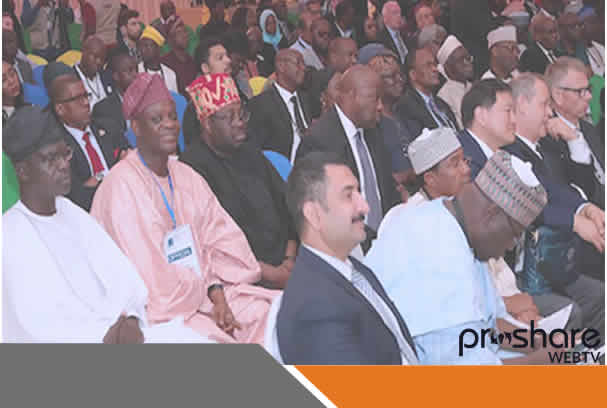Tuesday, July 31, 2018 5.00PM / ProshareWebTV
The recently proposed Nigerian PressCouncil Bill by the Senate of the Federal Republic of Nigeria has generated alot of debate across the country, considering the role of the press as thewatchdog of the government and the mirror of the society.
From the one-day public hearing betweenthe Senate Committee on Media & Publicity and Media stakeholder/practitioners it is clear that the bill is not receiving wider acceptance andendorsement.
Across the globe one of the major talkingpoints is the regulation of the media industry, which has come with resistanceas it is viewed as an attempt to crush opinions, views and perspectives togovernment policies or corporate actions.
In this article we outline 5 key things tonote about the Nigerian Press Bill 2018;
A Regulatory Process
The Bill seeks to regulate journalismpractice by establishing a statutory body to arbitrate between the media andmembers of the public. This is opposed to the insistence of media practitionersthat self- regulation subject to the existing laws of the land is the bestguarantee for media freedom in a democratic society.
In the United Kingdom there are tworegulatory bodies who are guided by the Royal Charter namely the IndependentPress Standards Organization (IPSO) and IMPRESS the press regulator recognizedby Press Recognition Panel in the country.
Norway has its Media Authority thatmediates in cases were press freedom and media neutrality are threatened in thecountry.
For the United States of America there isnothing like regulation of the media, the only role of the FederalCommunication Commission is to wade into instances were broadcasting provisionsare violated.
Professionalism in theMedia
The bill seeks to promote highprofessional standards for the Nigerian press and deal with complaintsemanating both from members of the public about the conducts of practitionersin the system as well as complaints from the press about the conducts ofpersons or organisations towards the press in Nigeria.
Autonomy of the Press
The leadership of the Senate of theFederal Republic of Nigeria are of the strong view that the passage of theNigerian Press Council Bill 2018, will strengthen the media and guarantee theirautonomy.
This will be through an institutionalframework that allows media practitioners to self-regulate and ensure theenforcement of codes and standards for all journalists.
Expunges PerceivedDraconian Provisions of Extant
The bill which is established to repealthe Nigerian Press Council Act of 1992, according to the Senate leadershipexpunges draconian laws and has made amendments to fit into the contemporarydevelopments in the media landscape.
In the wake of the increasing trends offake news circulation and how critical the media is in shaping narratives, theestablishment of a Nigerian Press Council is justified.
Position of theNigerian Media Stakeholders
As the NPC 2018 Bill passes secondreading, the Nigerian media community comprising the Nigerian Union ofJournalists (NUJ), Nigerian Press Orgainsation (NPO), the Newspaper ProprietorAssociation of Nigeria, NPAN, the Nigerian Guild of Editors, NGE, and theBroadcasting Organization of Nigeria, BON have all opposed the bill.
They have outlined several issues with thebill which include;
1. The Bill is sub judice as a suitinstituted by media interest groups against it is still pending at the SupremeCourt.
2. The Bill appears to be a subtlecrossbreed of the obnoxious military decrees: the Public Officers [protectionAgainst False Information] Decree No.4 of 1984 enacted under then Head ofState, Major General Muhammadu Buhari, and the Newspapers Registration DecreeNo.43 of 1993. Incidentally, the former military ruler is now the electedPresident.
3. The proposed bill is unconstitutionalas it runs against the principles and tenets of the rule of law
4. The Bill seeksto criminalise journalism practice despite the fact that the laws of thecountry already have enough provisions and avenues for seeking legal redress.
5. The bill seeks to incapacitate the media in theexercise of the duties and obligations imposed on it by section 22 of theconstitution to monitor governance and hold government accountable to thepeople.
6. The bill seeks for the Nigeria Press Council tousurp the powers of the courts by assuming extra-judicial powers.
7. The NPC bill brings undue interferencein the operations of the media in Nigeria as businesses registered under therelevant laws of the federation.
Related News
2. https://www.vanguardngr.com/2018/07/halt-the-press-council-bill/
4.Requesting The Removal Of ANews Story From Proshare – Process
5. United CapitalPartners Proshare for a Tweet-Meet on Nigeria’s H2, 2018 Outlook Report
6. THISDAY GroupAppoints Ijeoma as MD Arise Media And Adebiyi, Momodu, Adebowale, Chima AsEditors
7. The New Power of Social Media;Even Banks Can No Longer Ignore
8. Court Approves Website Seizureand Anton Piller Order Against Online Copyright Piracy Platform
 Lagos, NG • GMT +1
Lagos, NG • GMT +1











 4531 views
4531 views





 Sponsored Ad
Sponsored Ad
 Advertise with Us
Advertise with Us









